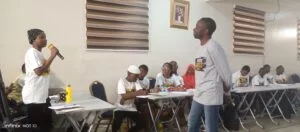
Mrs Ezinne Azunna, Project Coordinator/Convener, Maritime Writes Project, has urged the Federal Government to incorporate maritime education into school curriculum to enable the country become a leading maritime nation.
Azunna made the appeal at the third edition of The Maritime Writes Project, a training bootcamp which held in Lagos last week.
According to her, if maritime education is infused into the country’s curriculum, it means we are owning our maritime space and this will enable us do things differently.
“For a while, Nigeria have been trying to get into the International Maritime Organisation (IMO) seat, also tried to manage its resources as a maritime nation, the people who manage better are the ones that know and are familiar with the terrain.
“So, if we are calling for the industry to be harnessed, then we must also avail training to the people and that is what we are doing here. That is why we must own our maritime space.
“In the comity of maritime nations, the only people that have made it are those that own their maritime space, so we cannot begin to play lip service to it and the only way not to play lip service is to introduce it in our curriculum.
“Aquaculture have been introduced in Lagos State, but what of other places,” she said.
Azunna pointed out that the maritime industry largely contribute a whole lot to the economy, adding that it was time for government to pay more attention to the industry.
She said the industry had over 100 professions that should be harnessed to boost youth empowerment and employment creation.
Azunna said the bootcamp was instituted to help capture maritime heritage for economic growth and development.
She said the project, a three phase competition, started with an essay entry, noting that 90 entries came from Lagos which was trimmed down to 56.
“Why is it that the ordeal of females on ships 50/40 years ago is nowhere documented?
“I usually give a story about growing up, the only book I was exposed to that was maritime inclined was Robinson Crusoe by Donald Dafoe and it was amazing and at that point I did not know I will venture into the maritime industry.
“So, coming into the industry, I have a background in literature and I ask myself where is the maritime literature to read.
“If we want our young people to come into the industry, why is it that when one picks up a book, the first exposure is to the medical, accountant world and none about the ship or life of a diver,” she said.
Also speaking, the Head of Faculty, Maritime Writes Project, Dr Taiwo Nolas-Alausa, said the initiative had been focused on promoting the maritime sector by highlighting how it had enhanced the nation’s economy
Nolas-Alausa narrated the success story of a beneficiary of the Maritime Writes Project, Uchenna Ohiaeri, who recently won African Leadership Scholarship.
“I’m excited by the progress we have made over the years. Recently, we had the remarkable story of one of our trainees, Uche Ohiaeri, who won a scholarship of African Leadership in South Africa.
“After winning the award, she attributed her success to the experience she gathered at the Maritime Writes Project.
“This year’s edition is strategically positioned during the summer holidays. We can see the fruits ourselves. Our goal is to birth the next literary exploits like Chimamanda Adichie, Chinua Achebe, Wole Soyinka, among other great literary scholars,” he said.
Nolas-Alausa, also Director, Business Relations and Training, Lagos Chambers of Commerce and Industry, encouraged government, private and public sector organisations to prioritise the development of young people to enable them become assets to the nation and the world.
Also, Prof. Adegbite Tobalase, while making presentation on Art of Writing Children Literature, listed some characteristics of effective writing such as: putting the reader first, type of communication to provide information and to make recommendations.
He listed others as setting and meeting objectives of the writing, length of writing and use of imageries, layout and structure, developing and following house style.
Tobalase also educated the participants on traits of effective writing, which he listed as ideas, organisation, voice, words, sentences, correctness and design.
A 14-year-old participants, Murtadho Musa, said the training would help him improve on his writing skills.
“I also appreciate the organisers for this training because it will help us in the future, they are really impacting the society,” he said.














